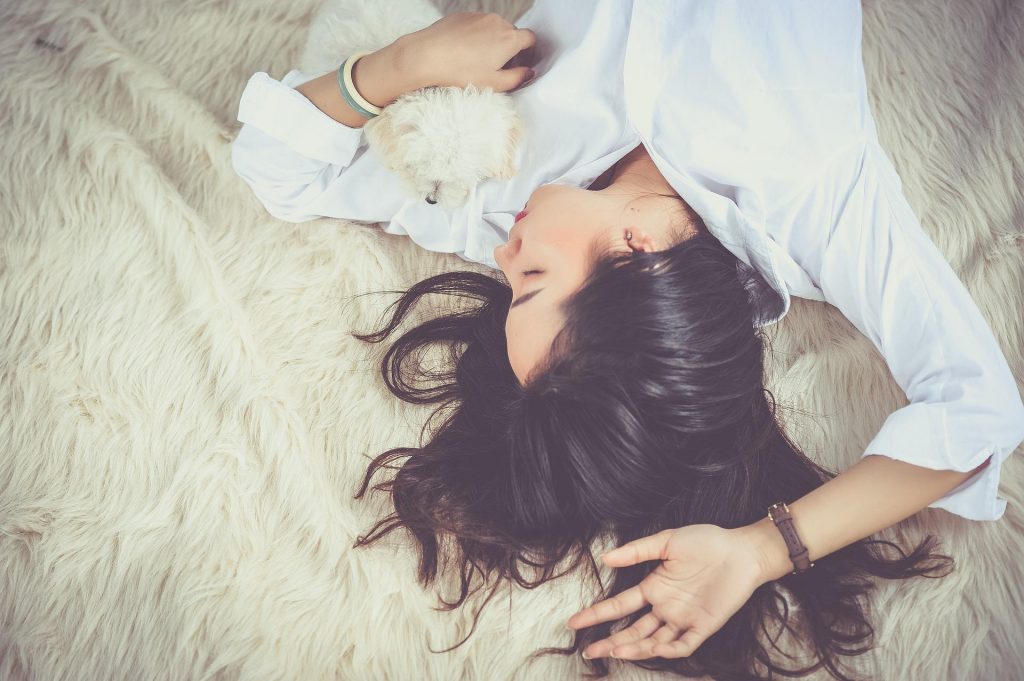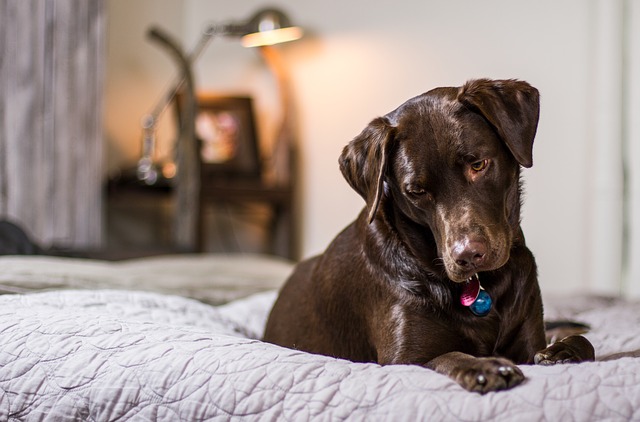Why Does My Dog Sleep on Top of Me?

New and veteran dog owners alike experience some of the most bizarre dog behaviors that often lead to interesting questions. Questions such as: “Why does my dog stare at me?” and “Why does my dog sleep on top of me?” can be easily explained in some instances, or quite complicated in others.
Let’s take a quick look at the question: “Why does my dog sleep on top of me?” and help you figure out why your pup has developed this funny habit.
Why Your Dog Sleeps on Top of You?
The simplest reasons why your dog sleeps on top of you are because it’s being protective, it finds you comfortable, or it’s a learned behavior that you have reinforced over time.
Of course, there are other more concerning reasons, such as your dog could be suffering from some sort of separation anxiety, or it could very well be marking its territory.
As you can see, the reasons why your dog sleeps on top of you can vary. To figure out the root cause, you’ll have to examine everything happing with the dog that could influence this behavior.
Reasons Why Your Dog Sleeps on Top of You
Let’s take a closer look at some of the main reasons why your dog loves to sleep on top of you.
You Are Comfortable
This is a leading reason why dogs love sleeping on top of their owners. This behavior is particularly common among smaller dog breeds with less fur on their coats. These dogs will often find your skin contact much warmer than their beds and will therefore prefer to snuggle up against you as much as possible.
This behavior, however, isn’t exclusive to smaller dog breeds. Even larger dogs can develop it. This is particularly true if you spend a lot of time with your dog and have become extremely close. Your dog will want to climb on top of you as a show of both affection and the desire to remain close to you and not be apart.
The more affectionate you are with your dog, the more they find you more comfortable than their dog bed, especially during the wintertime.
Their “Pack Animal” Instinct
Modern domestic dogs are the ancestors of wolves. Wolves are pack animals, and although the domesticated dog doesn’t carry this trait to the same extent, that instinct to remain as part of the pack is still there.
It’s exhibited in their behavior at dog parks, when most friendly dogs want to socialize with other dogs, and when they are protecting their owners from perceived threats.
Part of this pack behavior has to do with ensuring the survival of each pack member by huddling together to remain warm, especially during the winter. Wolves still huddle in dens to keep each other warm through body-to-body contact. This is exactly what your dog is instinctively trying to do today.
While survival may not be the main reason why your dog sleeps on top of you, that overall warmth, comfort, and security keep it coming back. This is particularly true since dogs are born in litters and, as pups, they quite literally begin their lives on Earth huddling up against each other for both comfort and warmth.
In many cases, most pups won’t stay in the same family as their siblings, so you will act as an acceptable replacement for their pack.
Giving and Receiving Protection
This also ties into the innate pack mentality that is in every dog thanks to their ancestry to wolves. One of the main reasons why wolves sleep close to and even on top of each other is protection. There’s always safety in numbers, especially in the wild.
Your dog is instinctively trying to protect you by sleeping on top of you, however, this goes both ways. By sleeping on top of you, your dog is not only protecting you but also expecting or subconsciously receiving protection from you, just like in a pack.
Separation Anxiety
Many dogs suffer from separation anxiety. This is particularly true with younger dogs that have just been separated from their litter.
For these dogs, the litter is all they might have known from birth and losing that immediate touch and instinctive feeling of security of the pack might give them some separation anxiety. The same is true for some rescue dogs that have been through some kind of trauma in the past.
One way to try and determine if your dog is sleeping on top of you because it suffers from separation anxiety is to observe its behavior:
- Does your dog only lie on your lap in the mornings?
- Does he or she act anxious when you are about to leave?
- Is your dog more interested in sleeping on top of you or next to you just before you leave the house and not right after you have arrived?
These are all signs of separation anxiety.
Seeking Attention
In some cases, your dog could be sleeping on top of you to get your attention. This is particularly true if it’s doing so on a day when you haven’t given it much attention. It could be that it needs you to play with it or show some affection by petting it.

It’s Expecting Something
Dogs tend to exhibit learned behavior. In some cases, your dog might be used to getting some kind of treat at the specific times during which he or she comes to lie on top of you. This is their way of communicating that expectation. They are trying to encourage you to get a move on and give them their treat already!
It doesn’t necessarily need to be a treat. They might need you to walk them, feed them, or even take them out for a bathroom break.
Your Dog Thinks It’s The Boss
This is a double-edged sword. On the one hand, your dog might be sleeping on top of you as a sign of admiration because he or she knows that you are the leader of the pack. Unfortunately, this isn’t always the case.
If your dog doesn’t know for certain that you are the leader of the pack, he or she might be sleeping on top of you to try and assert its dominance as well as mark you as their property in front of any other pets you may have in the home.
This can be a real problem for everyone involved. If your dog thinks it’s the leader of the pack, they are not only going to have discipline issues down the line, but they might even become overly aggressive toward you. This is all to show dominance.
If you are certain that you are the leader of the pack and your dog knows it, then you are safe and can chalk it up to admiration. If, on the other hand, you aren’t certain, then you need to put an end to that notion as soon as possible.
How to Stop Your Dog from Sleeping on Top of You?
As you can see, there could be several reasons why your dog is sleeping on top of you. While it might feel nice and cuddly at first, it can get tiring and concerning for both of you and reinforcing that kind of behavior could lead to even more unruly acts from your dog.
Here are some tips that can help if you want to stop your dog from sleeping on top of you:
Behavioral Training
This is often the answer when dealing with pets, especially dogs. Training your dog to sleep somewhere specific is a solution to this problem. You can do so using positive reinforcement dog training. This involves rewarding it for behaving in a manner that is desirable to you. Before you call on a professional dog trainer, here are some steps you can take to get your dog to sleep somewhere else:
- Make its sleeping area comfortable
- Get your dog to go to that area by making it stand there and rewarding it
- Encourage your dog to lay down in that area by giving it a treat
- Repeat this process several times a day until your dog realizes that it will be rewarded for sleeping where you want it to
Do Not Encourage the Behavior
Like most unruly things your dog does, it probably learned that behavior from you, albeit unwittingly. To discourage this behavior, you need to pay close attention to the things you do that might be encouraging it. For instance,
- Do you pet your dog anytime it comes to sleep on top of you?
- Do you try to get them off and then just give up and let them sleep there?
- Do you often call them to you when you want them to sleep on top of you so you can cuddle them?
These are all actions that reinforce this behavior in your dog. To counteract this learned behavior, start practicing positive reinforcement but only toward their actual designated sleeping area.

Find Ways to Reduce Separation Anxiety
In some cases, your dog might just be suffering from separation anxiety. While this is a much deeper and more complicated issue, there are some simple steps that you can take on a day-to-day basis to help reduce that anxiety. These include:
- Feeding them before you leave
- Walking and exercising them before laying down to sleep
- Taking them for their bathroom break at night before bed
- Petting them when you leave and when you come back to offer reassurance
When it comes to getting your dog to stop sleeping on top of you, ultimately, it’s all about positive reinforcement training. Not only will that teach them exactly where you want them to sleep, but it will also reinforce the idea that you are the dog parent and the pack leader. Once your dog knows that, he or she will be more willing to comply with your wishes to stop sleeping on top of you.
